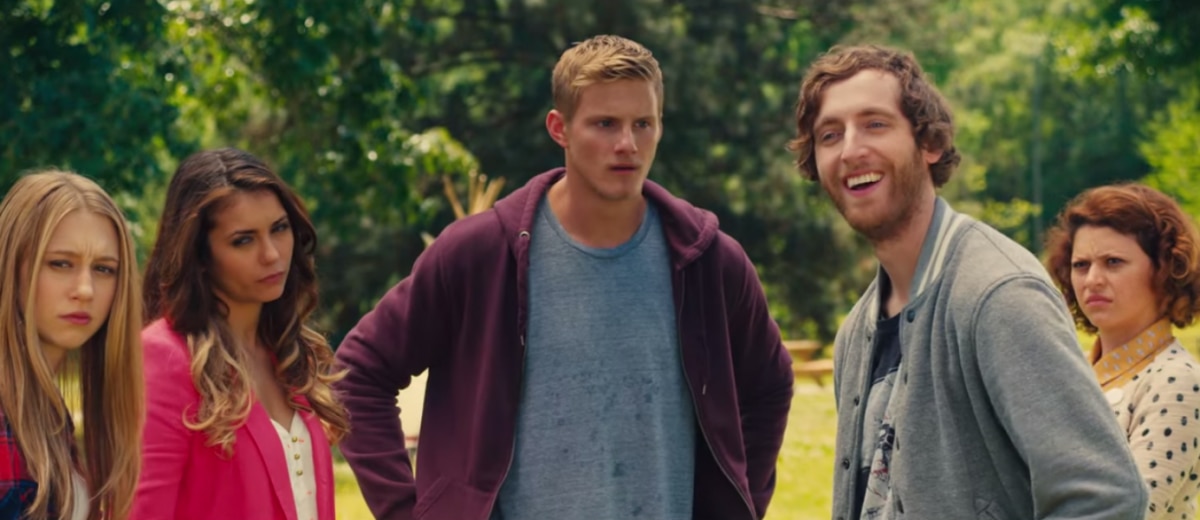#768 - The Final Girls
Todd Strass-Schulson, 2015

A handful of college students attend a theatrical screening of a cult slasher movie only to be magically transported inside the movie.
Trying to come up with inventive parodies of the horror genre is a tough racket in an era full of constantly-shifting perceptions of humour and irony, so it's perhaps no surprise that
The Final Girls just resorts to playing things straight underneath its outwardly comical premise. After a prologue introduces us to the young heroine (Taissa Farmiga) and her actress mother (Malin Akerman) before the latter dies in a horrific car accident, the film skips ahead a few years. Farmiga is now a college student struggling with homework who reluctantly agrees to attend a theatrical screening of
Camp Bloodbath, a
Friday the 13th-like slasher movie that also happened to star her late mother as one of the killer's bubble-headed victims. However, when a series of coincidences causes the theatre to catch fire, Farmiga and her ragtag handful of friends - sassy best friend (Alia Shawkat), Shawkat's gawky step-brother (Thomas Middleditch), handsome guy friend (Alexander Ludwig), and bitchy ex-friend (Nina Dobrev) - try to escape by cutting their way through the movie screen and find themselves transported inside the world of
Camp Bloodbath itself. They eventually clue into the fact that their only way out of the movie is to see it play through to the very end, which becomes a problem when Farmiga wants to save Akerman from the machete-wielding murderer even though, inside the world of
Camp Bloodbath, Akerman is actually playing her movie-within-a-movie character instead of Farmiga's mother.
The Final Girls certainly has a decent enough angle on making fun of horror, but that's not its whole purpose for being. The through-line is definitely Farmiga's character learning to accept her mother's death, especially by going through a serious trial by fire as she does what she can to help protect movie-Akerman from harm even through it threatens to jeopardise the gang's plan to escape the movie. That lends heart to an admittedly standard procession of "trapped-in-the-movie" gags such as visible inter-titles or
Groundhog Day loops where the real characters are made to repeat certain scenes until they play along with the plot. At the very least, it knows better than to try playing up the horror aspects, avoiding excessively gory violence or trying too hard to be scary. It also gets a lot of mileage out of the culture clash as the sharp-witted millennials butt intellectual heads with badly-written characters that include casually homophobic jocks and vapidly promiscuous airheads. While there's some degree of cleverness to the film's various gags, it's probably not a good sign that the strongest laughs I got were out of the film's post-credits gag reel than anything in the film proper. I do have to wonder if including said gag reel was the filmmakers' way of hedging their bets if the comedy featured in the film proper didn't pan out.
The performers may not be all that great, but seeing as they do have to play up two different but similar sets of horror stereotypes, they don't really have to pull off anything too difficult. Farmiga is a flat but personable lead and she has good chemistry with both of Akerman's characters, who gets to demonstrate a layer of nuance underneath her giggly blonde exterior as she gets to play a fictional character who has an existential crisis over their true nature. Middleditch proves the outright funniest member of the cast as the socially inept know-it-all, yet he isn't given much screen-time in the grand scheme of things. Ludwig doesn't do much more than play a fairly flat love interest, while Shawkat and Dobrev get to round out the main cast as constantly snarking sidekicks. There's not much to be said for the members of the
Camp Bloodbath cast, though Adam DeVine doesn't do too badly as the deliberately obnoxious token jock.
The Final Girls also has a striking visual style that involves the colours being heavily saturated and making some decent effects work really pop out in the process. Throw in some chaotic Raimi-style camerawork and some effective use of cheesy '80s pop (especially some surprisingly poignant use of "Bette Davis Eyes") and you have a film that may not be all that funny but is still a pleasant little affair that doesn't totally outstay its welcome.
 Nice to see that grandma is a whole eight years older than dad.
Nice to see that grandma is a whole eight years older than dad.


